Paula Vince's Blog: The Vince Review, page 11
November 2, 2023
'Evil Under the Sun' by Agatha Christie
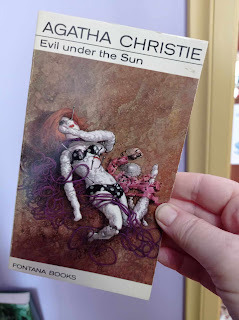
The beautiful bronzed body of Arlena Stuart lay facedown on the beach. But strangely, there was no sun and she was not sunbathing... she had been strangled.
Ever since Arlena's arrival the air had been thick with sexual tension. Each of the guests had a motive to kill her. But Hercule Poirot suspects that this apparent 'crime of passion' conceals something much more evil.
MY THOUGHTS:
Hercule Poirot is staying at the Jolly Roger Hotel on Smuggler's Island, a popular summer beach resort on Britain's southern coast. Some sunbakers remark that nothing bad could possibly happen at such an idyllic destination, yet our little Belgian detective knows that there is 'evil everywhere under the sun.'
One of his fellow guests, Mrs Arlena Marshall (nee Stuart), has the reputation of a femme fatale. She seduces men and breaks up families, reputedly relishing every moment. Fellows are bewitched by her and women fiercely resent her. So when Arlena is found strangled to death in a secluded cove, several other sun seekers may well have a motive.
There are two lovers' triangles. Dressmaker Rosamund Darnley has adored Arlena's husband Ken since their childhood, but Ken takes his marriage vows seriously. Poor, pale-faced Christine Redfern is upset that her hunky hubby Patrick keeps following Arlene around like a dog on heat. Fanatical clergyman, Stephen Lane, likens Arlena to Jezebel or the Whore of Babylon. And Ken Marshall's moody teenage daughter, Linda, simply loathes her stepmother.
I have to say, what we readers see of Arlena in the pages never strikes me as pure evil, which the characters would have us believe. In fact, I find it unbalanced that she's the target of all the fall-out from illicit liaisons, and never the silly men who are led by their libidos rather than their brains. Here is what we are told about the reactions of a group of older men, when she simply walks past.
'The eyes of Hercule Poirot opened, his moustache quivered appreciatively. Major Barry sat up and his protuberant eyes bulged even further with excitement; on Poirot's left the Reverend Stephen Lane drew in his breath with a little hiss and his figure stiffened.'
Yeah, eyeroll. How do we even know for sure the lady is playing on her beauty, as people accuse her, since she always elicits this behaviour for doing nothing at all?
Incidentally, Poirot states his belief that modern women's bathing costumes leave nothing to the imagination. 'What appeal is there, to remove all the romance and mystery?' (This novel was published in 1940.)
Reverend Lane is disturbed because he's noticed it's fashionable for many people to abolish hellfire and Satan from their collective consciousness, yet he's certain demonic entities are still gleefully doing secret mischief. Hmm, not sure if he was talking for his author, Agatha Christie, but plenty of theologians, such as C. S. Lewis, would agree with him.
Mrs Gardener, the American tourist, says, 'Those girls that lie out that in the sun will grow hair on their legs and arms.' I'll assume that's Mrs Gardener's personal delusion and not indicative of the era in general.
This is not the best Christie mystery I've read, but nor is it the worst. One thing in its favour is that there was only one death, and not the flurry of spin-off murders Christie sometimes sets off. Apart from Poirot, of course, I didn't really bond with any of the characters. In fact, poor Arlena Marshall was as likeable as anyone else. The baddies' motive didn't totally ring true for me, yet it's easy enough to believe they're also motivated by the adrenaline rush of escaping detection.
So good on you Poirot, for foiling their plan.
🌟🌟🌟½
October 26, 2023
'The Ghost of Thomas Kempe' by Penelope Lively
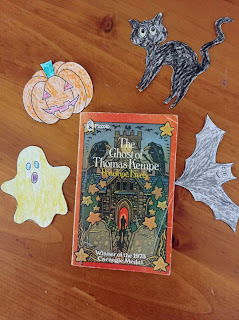
When James and his family move to an ancient cottage in Oxfordshire, odd things start happening. Doors crash open, and strange signs appear, written in an archaic hand. James finds that the ghost is the spirit of Thomas Kempe.
MY THOUGHTS:
When I found this novel in a secondhand shop, it was a blast from my past. I read it during Primary School silent reading sessions in the early 80s. What great nostalgia, to re-read prize-winning British kids' fiction published in 1973, which had its 50th birthday this year.
The Harrison family has bought East End Cottage, a charming, ramshackle old doer-upper. But since they've moved in, somebody keeps pulling annoying stunts and writing weird messages. Young James is getting blamed for all of them, because he's a bit left-of-centre himself.
Poor James is resentful and baffled. He knows the culprit couldn't possibly be a member of his own family. His wry, sensible father and slightly frazzled mother wouldn't bother, and nor would his smug sister Helen, who has a deficient sense of humour anyway. What's more, Tim, the scruffy stray dog who's adopted them, keeps barking and snapping at nothing.
Soon it's clear that the arrogant perpetrator desires to be known by James. He's an opinionated poltergeist named Thomas Kempe, who lived there in the sixteenth century practicing sorcery. Kempe insists that James becomes his assistant, whether he likes it or not. And since Kempe's behaviour includes persecuting other villagers whom he suspects of witchcraft or knavery, James must think of a way to end it fast. He soon discovers there are no exorcists listed in the Yellow Pages.
The story is so fun to read because James is such a cool and curious 20th century kid. His own quirky 'To Do' list is based completely on inquisitiveness without a trace of ego. This boy knows the fun of indulging in grandiose daydreams without a hint of angst that they might never come true, because he never truly takes them seriously.
It's full of insights about human nature, both past and present. When James' father summarily dismisses the supernatural, James realises that commonsense is as impenetrable as a stone wall. 'If people had to be so unswerving in their beliefs, the only thing you could do is let them go on their own way.' In fact, Mr Harrison and Thomas Kempe's ghost are quite similar, in their closeminded approaches.
I love it when James comes across a boy named Arnold, a kindred spirit his own age, but separated by a century. James discovers that reading all about Arnold creates a sort of oddly reciprocal friendship through the pages. And even though Arnold is (or rather was) on James' wavelength, James' school friend Simon is nonetheless satisfactory for other moments. We need all sorts of friends, including both soul mates and time mates.
All the time impressions are very cool. James learns that people develop their own layers, like onions, added to by the passing years. Senior citizens, such as his neighbour Mrs Verity, are often most multi-layered. The point comes through that young people are still buried deep within their older selves.
The final line is worth quoting for its insight into the passage of years.
Time reached away before and ahead: back to the crusading knight, and Thomas Kempe, and Aunt Fanny, and Arnold: forward to other people who would leave their names in this place, look with different eyes on the same streets, rooftops, trees. And somewhere in the middle there was James, walking home for tea, his head full of confused but agreeable thoughts, hungry and a little tired, but content.
Yep, we all take our part for a short time, then shuffle off the set.
🌟🌟🌟🌟½
October 19, 2023
'Little Dorrit' (Part Two) by Charles Dickens

MY THOUGHTS:
I shared my thought here on Part One and this second half was equally riveting.
We hear of lottery winners who don't handle their windfalls wisely because they retain the mindsets of poor folk. That's what happens to the Dorrit family following their freak family inheritance. At the start of this second section, entitled 'Riches', Papa, Tip, Fanny, Amy and Uncle Frederick are off and away to Europe to live the good life, but we sense that dressing them in lavish clothes will be a superficial band-aid fix to cover the identities of lack and devastation that have shaped them over several years.
Mr Dorrit and his two eldest kids now expect veneration based on their obscene amount of dough, although they're still exactly the same people they were back home in the Marshalsea without a cent. Will wealth really make a change for the better? Mr Dorrit's former source of great pride, his decades as a prison inmate, will now be the skeleton he longs to shut tight in his closet. Hiding it will surely add a new source of stress to his life. And it may be argued that Amy's whole purpose for living, which is performing acts of service, has just taken a major blow. Who will she be, as a rich lady of leisure?
Even though I'm discussing Part Two, I won't say much about the unfolding plot and risk giving spoilers. Suffice to say the farfetched twists and shocking destinies of the two biggest villains makes Dickens a real Victorian precursor of the long-running soap opera. (Kudos to the flamboyant, cloak-swirling Rigaud aka Blandois and his signature creepy facial gesture, where his nose and moustache intersect.)
What a varied lot of characters this book presents. We have old Mrs General, a snooty sort of governess hired to prepare the two Dorrit girls for high society. She exemplifies the most shallow and inhumane aspects of Victorian society, such as, 'a truly refined mind must simply ignore the existence of anything that is not perfectly proper, pleasant and placid.' This, of course, includes suffering and homeless people. Mrs General loves words beginning with the letter 'P' because they supposedly make the shape of your mouth look good as you say them.
Another standout for me is the cold and twisted Miss Wade, who regards anyone's generous behaviour towards her as unforgivable condescension, since she's so ultra-sensitive about her orphan origins. Viewing everything through the lens of her own paranoia, she mistakenly projects onto others her touchy insecurity about her social position. It was genius of Dickens to invent this beautiful self-saboteur. I'm sure we don't need to be destitute orphans to get where Miss Wade is coming from. Using our touchy triggers to second guess others is toxic behaviour. She's not really a villain, in the true sense of the word, hence Dickens doesn't visit down any fatal calamity on her head, but letting her carry on with her bitter delusions is punishment enough for her.
Even though they were not main characters, my mind keeps returning to the huge chip on Miss Wade's shoulder, and the regretful experience of her would-be disciple, Tattycoram, who learns the hard way that the people who stir our emotions aren't necessarily the most accurate readers of any situation. That's not to say there is no grain of truth in Tatty's grudge against the Meagles. Giving her that nickname alone is enough to ensure she never forgets her humble origins. Perhaps this girl's greatest takeaway is that life won't always deliver what seems fair, and the sooner we accept that, the easier we'll fare. Besides, life with the Meagles is certainly better than what they rescued her from.
Dickens makes certain sections a triumphant faith statement. I love how Little Dorrit's heartfelt, modest Christian outlook contrasts with the sour, Old-Testament eye-for-an-eye logic of old Mrs Clennam.
'Oh, Mrs Clennam, Mrs Clennam, angry feelings and unforgiving deeds are no comfort to you and me. Be guided only by the healer of the sick, the raiser of the dead, the friend of all who were afflicted and forlorn, the patient Master who shed tears of compassion for our infirmities. We cannot but be right if we put the rest away and do everything in remembrance of Him.'
As a culmination of all that has just gone down, this is powerful stuff. I was pleased during my googling to discover a small section of stained glass window dedicated to Little Dorrit herself, in London's St. George the Martyr church. (See above.) Adjacent to the Marshalsea Prison, it's the real life location where the fictional girl was christened, sought refuge on an icy night and eventually married her true love, Arthur Clennam. What a great tribute to Charles Dickens and also to the doggedly faithful Little Dorrit herself.
There are many other excellent characters who I haven't even tapped into yet, such as Arthur's talkative old flame, Flora, her corrupt but saintly looking father, Mr Casby, and their huffing and puffing employee, the diamond in the rough Mr Pancks. Not to mention Mrs Clennam's creepy business partner, Jeremiah Flintwinch, and his poor, abused wife, Affery. I also loved Daniel Doyce, the clever inventor who's suffered so much at the hands of the 'Circumlocution Office' in attempts to patent his product, he feels more like a criminal. But most of all, I love Arthur and Amy, two totally good-hearted people and a perfect match.
I can't help getting into the shipping mood for other couples this story might have produced, if it went on for even longer. Somebody on a forum I stumbled across suggested Tattcoram and young John Chivery, to which I echo, 'Sure, why not?' And how about poor Flora with either Doyce or Pancks, although neither gentleman would probably wish to put up with Mr F's Aunt for the long term.
It was clear to me early on that Little Dorrit would tick the boxes of a wonderful, immersive Dickens tale. Some of his books haven't quite hit the mark for me, but this one was bullseye, despite its unbelievable plot twists. Gee whiz, if it makes me question whether or not I'm sensing accurate signals from others or simply listening to my inner Miss Wade, it's worth the read for that alone.
🌟🌟🌟🌟🌟
October 12, 2023
'Little Dorrit' (Part 1) by Charles Dickens
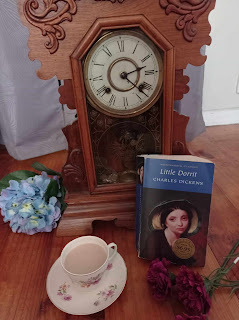
Amy Dorrit grows up in Marshalsea Prison, where her father is imprisoned for debt. But in this classic tale of poverty and wealth, sacrifice and greed, fortune can change in a moment - even Little Dorrit's.
MY THOUGHTS:
It's time to tick off another Dickens doorstop. This one is split neatly into two sections entitled 'Poverty' and 'Riches' so I'll make two blog posts out of my discussion. From the very start I sensed that the Dorrit family will prove to be the Victorian equivalent of sudden lottery winners, whose limited headspaces don't keep pace with their freak financial windfalls. I was keen to see whether the unfolding story would match my expectations.
Here goes with 'Poverty.'
Poor Arthur Clennam has had a harsh upbringing from unloving, demanding parents. He's on his way home to England, having worked since he was young with his father in China for 20 years. Arthur's dad seemed to die with some deep, unsettling regret which he couldn't articulate from his deathbed.
When Arthur tries to ask his morbidly pious old mother about it, she flies off the handle. Yet bedridden Mrs Clennam and her cranky servant, Jeremiah Flintwinch, seem to be up to their ears in some shady secret. And the house itself keeps making weird, creaky sounds.
Arthur is intrigued by Amy, aka 'Little Dorrit', the young woman who works each day as a seamstress for his mother. It doesn't take long to discover that Little Dorrit lives in the Marshalsea Prison. She was born and raised there, because her father has been a prisoner of debt for twenty-three years. Now Arthur Clennam can't help wondering if his parents' dodgy family secret has something to do with cheating the Dorrit family; hence his mother's inadequate attempt to make amends through Dorrit's daughter. Arthur makes it his business to find out, yet it's a maze of dead-ends and false leads out there.
In another thread, a French criminal named Rigaud who killed his wife is on the loose. Cavalletto, his former cell mate in Marseilles, is always trying to keep one step ahead of him.
A book in which main characters quickly win my affection is bound to be a good one.
Arthur is a lovely guy with a stubborn resolve to think the best. He's chosen to be an idealist as a quiet mutiny against the harsh way in which he was raised. (He was a man who had deep-rooted in his nature a belief in all the gentle and good things his life had been without.) So we have, in effect, a middle-aged, male version of Anne Shirley, which I find quite attractive. Gracious in disappointment, always willing to lend a hand, it's time 40-year-old Arthur gets a break, although he never really expects one. There are sometimes flashback glimpses of the younger, pushed-around, thwarted Arthur to keep us barracking for him.
Next there's Little Dorrit, that resourceful, diminutive young woman with soft hazel eyes who does her best to justify why the Mashalsea is not such a bad place to call home. She's like the lotus flower who can flourish in mud. Yet I can't help wondering how she survives on occasional nibbles of bread and butter and sips of tea. Maybe she's so tiny because she's stunted and starved, owing to a lifetime of putting aside the best for others. She's definitely one of Dickens' cohort of heroines who takes self-sacrifice to an unhealthy extreme, yet I sense Amy Dorrit has much to teach our generation.
In our era, the focus is so much on boosting our status and maximising our potential, quiet, dutiful people who accept their lot in life with no expectation of fanfare aren't very fashionable anymore. No twenty-first century counterpart character springs to mind. Perhaps Amy Dorrit is the sort of person who draws me toward Victorian novels. She counterbalances the restlessness and discontentment which seems to be in the modern air we breathe. Hence, she's refreshing.
But the 'good' characters aren't the only memorable ones.
Whoa, what a character Mr Dorrit is, that hilarious, destitute snob who plays up his own dubious status as longest serving prisoner to make himself a celebrity. In a way I admire the dude for his sheer front, and for always choosing the most flattering way to regard himself in a callous world determined to keep him in his place. That takes some solid self-esteem. Yet he does it through such audacious self-delusions, I can't help facepalming.
Arthur is friends with the Meagles family. There's another fascinating thread with 'Tattycorum', aka Harriet Beadle, the young workhouse orphan who was adopted as a companion for their beloved girl, Miss Minnie Meagle. Can two diametrically opposite interpretations of one person's life both contain grains of truth?
1) She's blessed and fortunate to have been rescued from the workhouse by such a caring family as the Meagles.
2) She's born beneath an unlucky star, the butt of condescension, forced to kowtow to a girl her own age who she has no respect for.
This exotic and resentful girl with her flyaway, shiny black hair and snapping black eyes chooses the second, resentful interpretation, and behaves accordingly by cutting loose. Sometimes Dickens releases a startling, colourful, non-conforming bird among his drab, dutiful little sparrows, (such as Amy Dorrit), and Harriet is surely one of them. Her aloof and mysterious mentor, Miss Wade, seems to be a piece of work too, with an agenda of her own. Dickens' 'good' girls may shine, but his 'bad' girls sizzle.
At this stage I'm feeling the whole plot is like some giant Jenga game, with old, sacred cows being gently dismantled and uncomfortable new developments being laid precariously on top. There's a whole lot of stuff being done behind the scenes on the Dorrits' behalf. There are secrets which will surely come to light. When the whole thing comes tumbling down, it'll be with a mighty crash.
Bring on Part Two.
October 5, 2023
Tips on Reading from Frankenstein's Monster
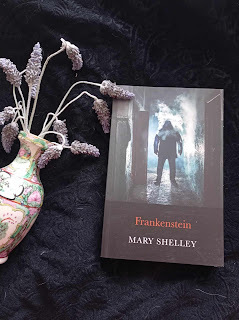
(This was a recent assignment for my creative writing and communication course. I thought it would fit well into my October reading schedule, which will focus on Victorian books or spooky reads, and this ticks both boxes. I'm thinking of writing more of these reflections in which famous fictional characters read books. Do you think that would be interesting?)
Mary Shelley’s famous classic has more modern parallels than we may imagine. Frankenstein’s bewildered, abandoned monster discovers a knapsack containing a handful of books, including John Milton’s Paradise Lost. Since he’s taught himself to read, books are fodder for his urgent hunger for knowledge. But the monster mistakes the epic fantasy poem for history instead of the speculative vision from John Milton’s fertile brain it really was.The monster’s pallid complexion surely erupts into gooseflesh and his coarse hair prickles the further on he reads. Then at last, torrid tears flood his bloodshot, recycled eyes. The poor monster can’t help relating to the character of Satan, who is thrown out of heaven, doomed to be an outcast and shunned by everyone he comes across. He even concludes there might be shared DNA between them. Hence, Paradise Lost becomes a huge influence on the monster’s despairing decision to wreak havoc on the innocent family members of the heartless creator who’d rejected him. He decides that since he’s evidently a devil, he might as well see if he derives satisfaction from behaving like one.
The desolate monster succumbs to credulity, believing everything he reads just because somebody wrote it and it’s there in print. This fictional incident suggests that the printed word sometimes carries clout it arguably shouldn’t. And of course, there will always be readers, like Frankenstein’s monster, who interpret a written piece in ways its author never intended.
Fast forward two hundred years, and we see the monster’s plight repeated by many others in our 21st century era of internet-fueled, panic-driven publications. Essays, articles, treatises, magazines and e-books are produced in record time. The internet gives self-proclaimed experts freedom to jump on their soap boxes about anything under the sun, which can set off a ripple effect of delusions. We’ve created a baffling culture in which readers believe all sorts of things. And the underlying reason is still simply because they appear ‘true’ when they are printed.
What’s more, we contend with a more sinister scenario than Frankenstein’s monster ever faced. He simply chanced upon that lost bag of books while he was out walking. He never dealt with the likelihood of alarming, printed literature zooming his way specifically. But computer algorithms determine the nature of the inflammatory content that may appear in our newsfeeds. It seems tailor made for each credulous soul. Depending on what lurks deep in our personal view histories, algorithms dredge up similar material to parade before us. It’s almost guaranteed to include something triggering among the mix. Human nature is unfortunately biased to latch onto negativity and drama, hence skewed stories crafted to upset us often rise to the top of our feed like cream in a milk pail. Keeping in mind the monster’s experience with Paradise Lost, the content we see is not necessarily accurate but just provocative. ‘If it bleeds it leads’ has long been a motto in the world of journalists, which may help explain why doom and gloom seems to wing its way straight to our screens.
If we are perpetually anxious, angry, disgruntled or depressed, perhaps the online world prompts us to be, for the sake of seducing our attention and getting our oh-too-willing fingers clicking links. The heartless, impersonal force that compels us cares nothing for our personal welfare or headspace, so long as we are staying online.
Ironically, our out-of-control online world has become a type of Frankenstein’s monster itself. The brainy tech designers behind the internet and social media profess to have had no idea what they unleashed. They haven’t a clue what might pop up on any individual’s newsfeed next, just as horrified science student Victor Frankenstein never knew which dearly beloved family member his recklessly vengeful creation would target next. And like Victor, they often express horror when they hear stories of how their own brainchild has taken on a life of its own.
In his book, Stolen Focus, journalist Johann Hari recounts his interviews with some Silicon Valley tech geniuses at the cutting edge of building our monster. These young men were once showered with praise and accolades for their work and applauded for building such a great and life-changing aid for humanity. But now in retrospect, the tech designers liken themselves to hapless Victor Frankenstein, who formed a living entity out of the best cadaver parts he could dig up in graveyards. Victor thought he’d be responsible for blessing the world with a wonderful super-being. Instead, the creature rampaged around murdering people and his every next move became anyone’s guess – a mystery impossible to predict.
Hari argues that the internet has become a similar malignant entity to Frankenstein’s monster, seducing us to believe whatever we read, shattering our attention spans and wreaking serious harm on our headspaces. He professed skepticism at first, considering this theory overly dramatic. Yet when he admitted his disbelief to those Silicon Valley designers, they looked at him as if he were, ‘a maiden aunt in the 1850s who had just found out about sex.’ The creators of our internet and social media claim to be too well aware of the sinister side to the brilliant creation they unleashed on our world.
Our takeaways from these revelations are clear. We must aim not to be like Frankenstein’s gullible monster, who believed every word he read of Paradise Lost. Without being total cynics who dispute every word we come across, we should read with a discerning and questioning spirit. Awareness is the key to avoid being sucked into a vortex of exaggerated reporting, misinformation, over-stated click baits and simple bad news which members of the general public don’t need to know.
Frankenstein’s monster is a villain, but he’s also shown to be a victim. Let us strive to be neither. We won’t add to the villainy by unwittingly spreading misinformation further when we reactively press SHARE with our trigger-happy fingers. Nor will we unthinkingly swallow any clickbait that drifts our way.
‘Of what a strange nature is knowledge,’ reflects Frankenstein’s monster to himself. ‘It clings to the mind when it has once seized on it, like lichen on a rock.’ That being the case, it is difficult to un-learn any false or disturbing content we take on board. Let’s aim to cultivate valuable moss in our minds, knowledge which is true, encouraging and motivating. And let’s try and clear the weeds that try to grab a strangle hand on our thoughts, content which is useless for not being true or beneficial at all.
Here is my review of Frankenstein by the amazing Mary Shelley, whose voice also turned out to be quite prophetic.
September 28, 2023
'Miguel Street' by V. S. Naipaul
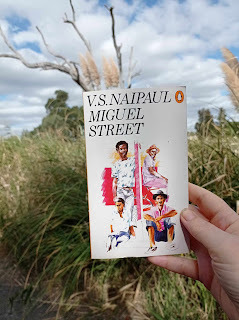
A stranger could drive through Miguel Street and just say ‘Slum!’ because he could see no more. But to its residents this corner of Trinidad’s capital is a complete world, where everybody is quite different from everybody else.
MY THOUGHTS:
This is one of the English syllabus texts from my distant past which I'm revisiting decades down the track.
It's essentially a bunch of linked short stories about a slummy section of Trinidad around the WW2 era called Miguel Street. There's a nostalgic narrator who never names himself, but takes turns shining the spotlight on different personalities who carved an impression on him in his boyhood. Each story is like a cameo or sketch of a person from his past. He was just a kid who didn't judge or pretend to understand much about the adult world, but simply reported how different people's conduct made him feel, and left it to his readers to form psychological insights or figure out how things really stood.
The residents of Miguel Street are living a rough old lifestyle with a collective knowledge that they're generally regarded as the world's riffraff, yet try to make the best of it. The author Naipaul evidently managed to achieve success with his writing, but acknowledges through his characters that being born somewhere like Miguel Street (or Trinidad in general) is a giant handicap from the very start. He uses his unprecedented soapbox as a published author to highlight several of his peers who weren't so fortunate. Even though this is written as fiction, I can't help asking, 'Is it really though?' So many characters are larger than life, I wouldn't be surprised if they were real people and Naipaul himself was the young narrator.
Some of them are super poignant. I can't forget Elias, the boy with the abusive family profile who decides to become a doctor, yet finds the exams are skewed against people with his background, no matter how hard he studies. (We felt it wasn't fair, making a boy like Elias do litritcher and poultry.) Or Bolo, the disillusioned barber who's been let down by so many scams in the media, he refuses to believe the news when he wins the sweepstakes for real.
Others try to raise their status through any paltry means possible, such as Eddoes, the spic-and-span rubbish cart driver who boasts about the VIPs whose garbage he collects. There is also B. Wordsworth, an aspiring poet who impresses our young narrator by doing everything as if it were some church rite, and aims to write the greatest poem in the world at the rate of one line per month. Although he misses his twenty-two year deadline, the intention is there. When you can't achieve your fondest dreams because the world appears to be pitted against you, you can at least extend your own creativity as far as you can. This makes for some characters and events as colourful as the tropical fruit that appears abundantly throughout these pages.
Their colonial background is reflected in their language. Everyone speaks with a local patois which tries to observe the rules of formal English but never quite pulls it off. Everything from proper tenses to accurate syntax is really jumbled, with quite a cool result. It's intriguing that these people at that time period adopted the British dialect rather than stick to whatever Caribbean and Creole speech was also current. Perhaps they had no choice. Yet they express facts in matter-of-fact ways which English never would. A prime example is, 'A girl is making baby for me,' which occurs several times throughout these stories. (A quick internet search reveals that it's now regarded as a dialect in its own right, called Trinidadian English.)
Some aspects of the story make me really sad. First is the fact that every resident of Miguel Street generally agrees that life in Trinidad is bound to turn a person bad. This encompasses everything from excessive drinking and chain smoking to domestic violence, murder and other crime. It may well be true, owing to the invisible but powerful handicap everyone faced when it came to pursuing genuine ambitions. Naipaul writes his case really well. Our boy narrator admits candidly that he was heading in the same direction, because the Trinidad atmosphere is just so oppressive, he felt he couldn't help it. Sound characters such as Titus Hoyt the tutor, or B. Wordsworth the poet suggest that not every citizen resorts to making life miserable for others, but that tendency is a major theme of the book.
All the wife beating leaves a sober impression! Even the kindly role models and 'good' characters believe that it's sensible for a man to keep his spouse in line with physical beatings every so often, as long as they don't make a habit of it. Sadly, these male characters, who know full well they are victims of racism, resort to sexism of the worst kind to alleviate their own frustration. To be a woman living in Miguel Street must have been the worst misfortune, although some of the female characters Naipaul presents had plenty of spirit and force of their own, including the protagonist's mother, who brought up her son with a harsh hand and never hesitated to strike him.
On the whole, V.S. Naipaul has written a cultural eye-opener that highlights the best and worst of the human spirit. Perhaps the best summing up line is this one. 'A stranger could drive through Miguel Street and just say, "slum" because he could see no more. But we who lived there saw our street as a world where everybody was quite different from everybody else.' I wouldn't mind reading more of Naipaul's work in the future.
🌟🌟🌟½
September 21, 2023
Some Funny Spam
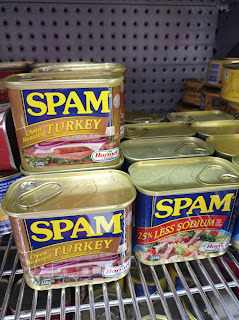
One of the best things about this blog is comments from readers whose search engines have landed on my posts while googling for specific books. I don't know many SEO tweaks I can do from my end to make these encounters even more frequent, but at least evidence has proven that it occasionally happens anyway. What also boosts my spirits is occasionally seeing my own blog posts pop up when I'm in the middle of Google searches about specific books. It's a surreal feeling, to see something I've worked hard on appear in my feed as if I'm a stranger.
However, the flip side of being available for discovery is all the spam! The abundance of this outnumbers legitimate book comments by far. Opting to use the comment filter has proven to be highly necessary. Without it, this blog would be full of comments which are way off the mark.
Generally, the spam I get in my comments share these three characteristics.
1) It's essentially self-promotional on behalf of the sender.
2) The people who post it never bother to read my blog posts for suitability, or they would surely realise that my content doesn't match their agendas. Perhaps some of the comments are from bots. I wouldn't know.
3) They can ooze with gushingly false compliments that make me wince.
So here's my sample of some of the stuff I've had to clear. Although I stopped them from going live, today I'm lifting the lid for your amusement.
A leasing agency warned me about 10 signs of mold toxicity on Literary Houses that Perish.
A mental health therapy practice advertised their services on Viktor Frankl's Man's Search for Meaning.
Another psychiatrist put their two cents worth on managing depression and anxiety in Enchantments and Depression. (Hmm, I'll wager they don't see many story book style enchantments in their clinic which I focused on here.)
A skincare company left a long spiel about their tailored expertise on Madeleine L'Engle's A Wrinkle in Time.
Someone hyped up their nasal hair trimmer for men on The Illusionist's Apprentice by Kristy Cambron (for whatever reason).
A rental company attempted to convince me that they provide the best cars and bikes on Stories featuring Railways and Trains.
A private tutor advertised his services on The Tutor's Daughter by Julie Klassen. (He also gave me the sweeping compliment that, 'every blog post you write is a unique experience! Yeah, yeah.)
Hyundai Spare Parts mentioned their quality stock in Stories with Mirrors.
A pool/spa builder gave himself a lengthy plug in Books to read in the bathtub. (Pun intended.)
A safety machine's website designer commented on Remarkable Causes of Death in Books inviting me to consult them.
I got tips on how to beat driving test anxiety on Alain de Botton's Status Anxiety. (That review got a bit more attention too. Somebody else thought they'd plant a link to their article, 'How to get Xanax without Prescription' there. Um, no thanks, it's not that sort of anxiety.)
'Everest Panorama Trek in 10 Days' urged me to give it a try, on We don't have to tackle Mt Everest.
A rose preservation company invited me to contact them for advice in Roses in Literature.
A tea franchiser offered their services in Famous Storybook Tea Parties.
A company that provides cardboard gift boxes advertised themselves on my post about The First Christmas Presents. Thanks guys, but I doubt the three wise men considered such details.
A recruitment finance office contacted me regarding The Invoice novel by Jonas Karlsson.
A foreign call girl centre, of all people, commented on my Anne of Green Gables read-athon. They added, 'Thank you, Sir. I like your blog very much.' What the...?
And to wrap it up, a divorce lawyer offered his services on C. S. Lewis' The Great Divorce. Little does he realise the characters in this book are far beyond any service he can provide.
Whew, it's all in the life of a blogger, as I'm sure many others know. And this isn't even including the occasional mean comment. (Such as, 'What a 😢 load of 💩' on my Trixie Belden grand finale post. I was glad to delete that one. Folk, if you don't like what I have to share, you don't have to visit and read it.)
Thanks, as always, to supportive, genuine readers who stick around.
September 14, 2023
'A Murder is Announced' by Agatha Christie
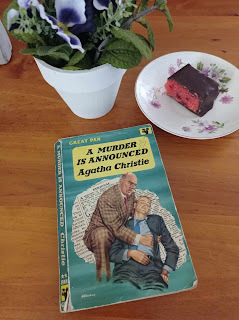
'A Murder is Announced' is a staple of crime fiction and often considered as the best Miss Marple novel. The villagers of Chipping Cleghorn, including Jane Marple who is staying nearby, are agog with curiosity over an advertisement in the local gazette which reads: ‘A murder is announced and will take place on Friday October 29th, at Little Paddocks at 6.30 p.m.’ Is this a childish practical joke? Or a hoax intended to scare poor Letitia Blacklock? Unable to resist the mysterious invitation, a crowd gathers at Little Paddocks at the appointed time when, without warning, the lights go out…
The novel was promoted on both sides of the Atlantic as Agatha Christie's 50th book and published in 1950 by William Collins.
MY THOUGHTS:
This great mystery starts over breakfast in several households, with various townsfolk of Chipping Cleghorn discussing a strange announcement in the local Gazette.
'A murder is announced and will take place on Friday October 29th at Little Paddocks at 6.30pm. Friends, please accept this, the only intimation.'
They all guess it's probably a general invitation to a Murder in the Dark style event and make plans to show up. But the household at Little Paddocks turns out to be as mystified as everyone else. To their collective horror, a young intruder becomes the murder victim. Rudi Scherz is (or rather was) a receptionist at the Royal Spa Hotel who placed that ad in the paper himself for whatever reason. He's revealed to be a petty thief or 'picker up of unconsidered trinkets.' Whether his death was intended as a suicide stunt or is a genuine accident remains to be discovered.
The biggest question is why the heck choose Little Paddocks as the grisly venue? Scherz had nothing to do with the folk who live there, headed by sensible Miss Letitia Blacklock. Detective Inspector Dermot Craddock is a trifle irritated when senior sleuth Miss Jane Marple hobbles onto the scene, but grudgingly admits that he needs all the help he can get.
'I'm afraid I have no gift except a tendency to believe the worst of human nature,' she demurs. 'Not a nice trait but often so justified.'
It irks me how everyone refers to Swiss citizen Scherz as 'the foreigner' in such a snobbish, derogatory manner throughout the story. Miss Blacklock accuses the police of having an anti-foreigner complex, yet it's not just them. We get a picture of an insular village mindset where everyone knows each other and regards strangers with suspicion. It's also clear from the 1950 publication date of this novel that the aftermath of World War Two was still turning social structure topsy-turvy. People were anxious to cling to their snobbery-as-usual for comfort. It's a revealing read as a historical document as well as a murder mystery.
A decadent, homemade chocolate cake referred to as 'Delicious Death' is featured in this story. Mitzi, the uptight refugee cook, is coerced to concoct her specialty for Miss Dora Bunner's birthday. And in real life, Agatha Christie dedicates the book to her friends, Ralph and Anne Newman, 'at whose house I first tasted Delicious Death.' Hmm, I wonder if they left a recipe. It leaves the characters feeling a bit bloated with an unusually high sugar fix while rationing was still a thing. But they didn't care, and nor would I.
The ending rewarded me for a cosy afternoon reading, with all the Wows I could hope for! I'd noticed a few fishy details but the full picture is still a great a-ha moment. Another murderer who almost got away with a huge risk is brought to justice. And a couple of details I assumed were typos turn out to be integral to the plot. Okay, enough said.
I love Agatha Christie novels but don't usually give them 5 stars. This time I will, for the masterful twists and larger-than-life characters. It's a great prototype of all the surprises she does best. Christie gets all her ducks in a row here, creates understanding for the murderer, if not a sort of sympathy, but makes it clear that escaping justice would have been preposterous. (After all, we feel sorrier still for the victims.) And it establishes Miss Marple even more firmly as one of my favourite sleuths.
🌟🌟🌟🌟🌟
September 7, 2023
'The Pilgrim's Progress, Part 1' by John Bunyan (and Alan Vermilye)
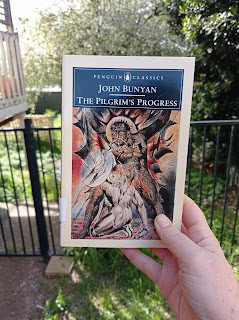
MY THOUGHTS:
I've been plowing through The Pilgrim's Progress for a class assignment I'm working on, and supplementing the original text from 1678 with 'A Readable Modern Day Version' by Alan Vermilye, who has taken pains to retain every detail from the original text while making it easier for 21st century readers. Having both side by side, I have to agree Vermilye does us all a big favour.
This classic was first written from prison, where Puritan author Bunyan was incarcerated for his supposedly radical preaching. He explains at the start how a flash of inspiration (or providence) led him to explore the Christian faith in the form of an extended metaphor. Since he had plenty of time on his hands, why not give it a crack? So this is the tale of a long and often arduous quest. Each character represents an aspect of human nature, making them very one-dimensional. If you want subtle character nuances, you'll have to find another book. With characters bearing names such as Ignorance, Flatterer and Talkative, what we see is basically all we get.
In a similar manner, all the geographical and topographical locations along the path represent life experiences and attitudes. So the Slough of Despond and the Hill of Difficulty aren't places we'd choose to add to our itineraries, yet unfortunately for the pilgrims, they lie along the route to the Celestial City and detours are impossible.
The main character, aptly named Christian, leaves his home in the City of Destruction to journey on foot to the Celestial City, where he'll be in God's presence and all his problems will be over. The burden he bears on his back is super heavy, but a kind mentor named Evangelist assures Christian that if he watches his step, it will fall off spontaneously enroute, when he reaches the place of the Cross. Christian is instructed to stick strictly to the narrow path, yet his experiences prove how easy it is to veer right or left with the best intentions. Naturally he meets plenty of fellow pilgrims along the way, whose revealing names give us readers broad clues of whether or not they'll be trustworthy.
Whew, I can't deny it's a moralistic read with the subtlety of a sledgehammer, yet strangely compelling. Christian's forced face-off with the fiend Apollyon must have wowed those 17th century readers. Not only does Apollyon's appearance sound super stunning (fish scales, dragon wings, bear feet, and lion mouth), but he breathes intimidating lines with smoke and fire. 'You've already been unfaithful to your king... prepare to die. I swear by my infernal den that you will go no further. It's here that I will spill your soul.' Then we have our unassuming hero Christian's comeback, 'Don't celebrate just yet, Apollyon!'
(Christian doesn't actually manage to kill Apollyon. Nope, this symbol of Satan merely flies off, to presumably hang out for a more opportune time.)
We get toured through several abysmal places where we've probably all occasionally found ourselves. There's the Valley of the Shadow of Death, where Christian can't recognise his own voice and believes a demon's hateful whispers are coming from his own soul. And there's Vanity Fair, the perpetual party town where pleasure seekers hang out to gorge on the products of sensual stalls and sideshows. Further on again, Christian and his friend Hopeful are captured by the giant Despair and taken to his Doubting Castle. This oversized fellow leaves his prisoners with the option of committing suicide by whatever means they choose, whether knife, noose or poison. Ouch, that's how Despair operates.
From my modern perspective, I was intrigued by the hapless young man, Ignorance, who struts along confident that his own sound heart, with its comforting whispers, will gain him entry to the Celestial City. Christian and Hopeful are inspired to ask him bluntly, 'How can you even believe in Christ when you don't see any need for him? You don't see original sin or your actual transgressions but rather have such a high opinion of yourself.' Ouch, is Ignorance a harbinger of our own era, in which we are encouraged to keep building up our self-esteem, focusing on our brilliance and excusing ourselves for our shortcomings? I actually found myself liking this lad, for his refusal to let Christian and Hopeful tarnish his rosy outlook, which I know may be a worrying sign of our times since we're clearly not supposed to. I suspect if Bunyan could time travel to the twenty twenties, he'd discover plenty of Ignorance's descendants walking around, even filling church pews.
I'm glad to have read this classic. Sure, Christian sometimes comes across as a smug, inflexible know-it-all, but yet again, I can't help wondering whether it's our laissez faire 21st century outlook that paints him as such. I'm more than happy to continue with Part 2, in which Christian's wife, Christiana, and their four sons, having repented of brushing him off at his journey's outset, decide to follow in his footsteps. Yay, bring on more adventures in this apparent fantasy world which, in fact, represents an average human life.
I'd considered taking off a star for its dated style and heavy-handedness, but on second thoughts, it totally deserves five stars for its creative presentation of theology, its incredibly ambitious scope and John Bunyan's scriptural references peppered all through, so impressive because he had no computer file to store them in. What an amazing effort!
Kudos to Alan Vermilye too, for his translation. I recommend reading both, as I've been doing.
🌟🌟🌟🌟🌟
August 31, 2023
'Pollyanna's Castle in Mexico' by Elizabeth Borton
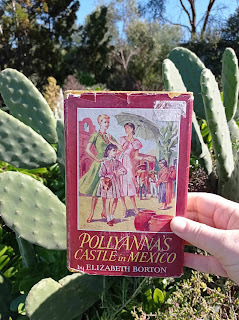
MY THOUGHTS:
Oh dear, this 8th Glad Book is nothing to be glad about. It's even worse than Pollyanna in Hollywood, and I really struggled to get through it.
Jimmy lands an engineering job in the heart of Mexico, so as is now the pattern, Pollyanna and the kids trail along. Miss Aguamonte owns a gold mine with a sinister reputation, as her father died down there during his final expedition. Situated within a mountain nicknamed, 'The Mountain of Death,' she wants it drained and checked out by a professional. No locals will go near the place, but Pollyanna is happy for Jimmy to barge right in. Those two are very flippant regarding the supernatural.
Junior, who is now about 15, is taking advantage of his passion for photography whenever he can, and accompanies his dad on a couple of exploratory trips to take photos. Judy, aged 12, is believed to be delicate, impressionable and poetic, so her mother treats her like fragile glass. Judy also develops her first crush on a boy. Ruth, who must be 9 or 10 by this stage, still comes across as a kindergarten kid.
Borton seems clueless about the kids' development. She has the young man Junior still speaking in a high-pitched voice, and tweenie Judy needing her hand held to cross the street. Then Pollyanna talks to her pre-adolescent daughter as if she's five years old.
'I wonder if you know how many little girls are left in school while their mothers and fathers travel for pleasure of because of business. You should be glad that daddy and I always take you with us everywhere.'
There is far too much description of Pollyanna being toured around Mexico, 'ooohing' and 'aaahing,' without anything happening plot wise. And the continuity aspect is a facepalm. After Smith preserved the integrity of Porter's original classics so beautifully, the series regresses to a game of Chinese Whisper with the introduction of Borton as the third author. She retains just a smidgin of what came before and even mixes up Aunt Polly and Aunt Ruth; a colossal blooper at this stage of the game. I blame the publisher too, for allowing an oversight of this magnitude to slide repeatedly through the editing filter. Seriously, didn't they have even one single proofreader who had read the first seven books? I won't even get started on what happens to poor Nancy, who seems to have aged by about 30 years compressed into one.
When the action finally does heat up, it loses credibility fast. At this point an earthquake, light plane smash and the two Js being tied up at gunpoint just makes me groan. I now face the remainder of the series with trepidation rather than anticipation, especially when I see the name of Elizabeth Boring, sorry, Borton on the next two books. Her offerings remind me of some of the more forgettable fan fictions I've come across.
Never thought I'd say it but even Jimmy's sexiness is insufficient to save this story. I guess next up will be Pollyanna's Door to Happiness, although I doubt it'll make me very happy. This series clearly should have stopped when Harriet Lummis Smith put down her pen.
🌟
The Vince Review
I invite you to treat this blog like a book-finder. People often ask the question, "What should I read next?" I've done it myself. I try to read widely, so hopefully you will find something that will strike a chord with you. The impressions that good books make deserve to be shared.
I read contemporary, historical and fantasy genres. You'll find plenty of Christian books, but also some good ones from the wider market. I also read a bit of non-fiction to fill that gap between fiction, when I don't want to get straight on with a new story as the characters of the last are still playing so vividly in my head. ...more
- Paula Vince's profile
- 108 followers



